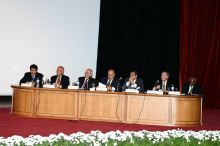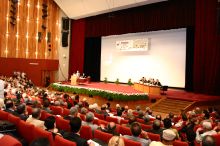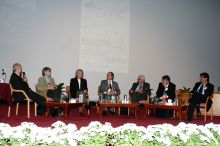Einstein Symposium begins
Posted on
Alexandria, 4 June 2005—Wednesday, 4 June 2005, witnessed the opening ceremony of the Einstein Symposium, 4-6 June, organized by the Bibliotheca Alexandrina, and attended by H.E. Dr. Amr Salama, Egyptian Minister of High Education and Scientific Research; Dr. Ismail Serageldin, Director of Bibliotheca Alexandrina; Professor Mohamed Hassan, Executive Director of Third World Academy of Science; Dr. Farouk El-Baz, Director of Center for Remote Sensing, Boston University; Professor Phillip Griffiths, Director of Institute of Advanced Studies; Dr. Mohamed Abdellah, President of Alexandria University; as well as Prof. Mohamed S. Elnaschie, Visiting Professor, Alexandria University, Egypt.
The session began with Prof. Elnaschie’s welcoming note on behalf of the Egyptian public. He was followed by Dr. Abdellah who spoke of Einstein, and his contributions and their tremendous impact on society. Professor Griffiths, representing both the IAS, co-organizers of the Symposium, and the National Academy of Sciences, USA, shed light on the miracle year of Einstein (1905), his five major papers on the special theory of relativity, Brownian motion and the quantum theory, as well as Einstein’s views on war and peace.
Professor Hassan then gave a brief about TWAS, its vision and aims, its targeting the countries of the South in putting a strategic vision for achieving sustainable development. He shed light on the duties of TWAS in supporting scientific research, financing scientists, and facilitating links between scientists and institutions.
Speaking on behalf of the Board of Trustees of the BA and the Academia Bibliotheca Alexandrinae, Dr. El-Baz welcomed the audience and pointed out the role of the BA as an institution for preserving, increasing and disseminating information, as well as a “lighthouse of data”.
H.E. Dr. Amr Salama, on behalf of H.E. Prime Minister Dr. Ahmed Nazif, stated the vision and goal of the Symposium and how its partaking in the international celebration of the World Year of Physics. Moreover, he encouraged university and school students to dedicate more interest to science.
Finally, Dr. Ismail Serageldin, concluded the opening session with his presentation “Why Einstein”, on the life, legacy, theories, and papers of Einstein. He also highlighted the contributions of prominent figures in physics who helped shape science history.
The day’s highlights included four lectures chaired by Dr. Ismail Serageldin, of which three were given by Nobel Laureates. Professor Murray Gell-Mann, distinguished Fellow of the Santa Fe Institute, shed light on Einstein and creative thinking; while Professor Klaus von Klitzing, Director of the Max Planck Institute for Solid State Physics in Stuttgart, Germany, touched upon Einstein’s Nobel Prize and Modern Nanoelectronics. “Unraveling Nature’s Elementary Building Blocks: Challenges of Big Science” was explored by Professor Gerard ’t Hooft, Professor of Theoretical Physics at University of Utrecht, while Professor Edward Witten, Professor of Physics at the Institute for Advanced Study in Princeton, delivered a lecture on Einstein and Unification.
A round-table discussion brought the science-packed day to a close. Moderated by Dr. Ismail Serageldin, its participants included the Nobel Laureates; Prof. Murray Gell-Mann, Prof. Klaus von Klitzing, Prof. Gerard "t Hooft; in addition to Prof. Mohamed Elnaschie; Prof. Douglas Hofstadter, College of Arts and Sciences Professor of Cognitive Science, Indiana University; and Prof. Michio Kaku, Professor of Theoretical Physics at the City College of the City University of New York. The discussion touched upon the future expectations from physics in relation to other branches of science, the ultimate goals of cosmology, as well as the future of new discoveries. Ending the talk with a positive note on the quest for scientific truth, Dr. Serageldin quoted Sir Isaac Newton, “I do not know what I may appear to the world; but to myself I seem to have been only like a boy playing on the seashore, and diverting myself in now and then finding a smoother pebble or a prettier shell than ordinary, whilst the great ocean of truth lay all undiscovered before me.”
The Einstein Symposium comprises five main events, held at the BA to celebrate physics, among which is a Public Forum, addressing a wider audience and covering two venues, namely science and society, and Einstein as a man and the legacy he left behind. A Scientific Meeting (closed sessions), co-organized by the Institute of Advanced Studies in Princeton, also takes place in parallel to the Forum, with Professor Edward Witten chairing its organizing committee. In addition, an exhibition that includes rare pictures and copies of important documents, is prepared in coordination with the American Museum of Natural History. The celebration of physics also includes daily workshops for children.
 |
 |
 |
| The Opening Session Speakers |
The Opening Session |
The Round-table Discussion |